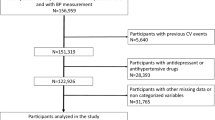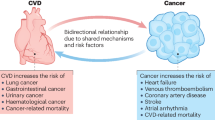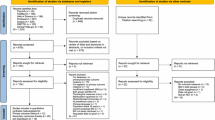Abstract
Current hypertension guidelines advocate strategies encouraging healthy lifestyle behaviours. So far, there is a paucity of studies for the efficacy of such multifaceted programmes. The aim of this study is to investigate the efficacy of an 8-week health-promotion programme for lowering blood pressure (BP) in prehypertensive and hypertensive patients in the community. This was a quasi-experimental study using wait-list controls of 548 patients. The intervention group was administered with an 8-week health-promotion intervention. Measurements included home BP, smoking, body mass index (BMI), perceived stress, depression, anxiety and Health Locus of Control. After adjusting for confounders, the intervention group had a significant reduction in both systolic BP (SBP; mean −2.62 mm Hg, 95% confidence interval (CI): −1.29 to −3.96) and diastolic BP (DBP; mean −1.0, 95% CI: −0.93 to −1.9) compared with controls. In all, 14.9% of patients in the intervention group had >10 mm Hg reduction in SBP vs 4.4% in the control group (P<0.001, numbers needed to treat (NNT)=10). With regards to DBP, 21.7% of patients in the intervention group had >5 mm Hg reduction vs 12.5% in the control group (P=0.01, NNT=11). In terms of effect size, moderate-to-large improvements of BMI, perceived stress, anxiety, depression, external and chance Health Locus of Control were recorded. Changes in SBP and DBP were attributed to BMI and depressive symptom reductions, respectively. Comprehensive non-pharmaceutical programmes for BP management are strongly encouraged. Their long-term benefits on cardiovascular morbidity and mortality remain to be established by future research.
This is a preview of subscription content, access via your institution
Access options
Subscribe to this journal
Receive 12 digital issues and online access to articles
$119.00 per year
only $9.92 per issue
Buy this article
- Purchase on Springer Link
- Instant access to full article PDF
Prices may be subject to local taxes which are calculated during checkout
Similar content being viewed by others
References
, WHO. A Global Brief on Hypertension: Silent Killer, Global Public Health Crisis. WHO Press: Geneva, Switzerland, 2013.
Efstratopoulos AD, Voyaki SM, Baltas AA, Vratsistas FA, Kirlas DE, Kontoyannis JT et al. Prevalence, awareness, treatment and control of hypertension in Hellas, Greece: the Hypertension Study in General Practice in Hellas (HYPERTENSHELL) National Study. Am J Hypertens 2006; 19 (1): 53–60.
Sparrenberger F, Cichelero FT, Ascoli AM, Fonseca FP, Weiss G, Berwanger O et al. Does psychosocial stress cause hypertension? A systematic review of observational studies. J Hum Hypertens 2009; 23 (1): 12–19.
Lambert EA, Lambert GW . Stress and its role in sympathetic nervous system activation in hypertension and the metabolic syndrome. Curr Hypertens Rep 2011; 13 (3): 244–248.
Hamer M, Steptoe A . Cortisol responses to mental stress and incident hypertension in healthy men and women. J Clin Endocrinol Metab 2012; 97 (1): 29–34.
Esler M, Rumantir M, Kaye D, Lambert G . The sympathetic neurobiology of essential hypertension: disparate influences of obesity, stress, and noradrenaline transporter dysfunction? Am J Hypertens 2001; 14 (6 Pt 2): 139–146.
Torres SJ, Nowson CA . Relationship between stress, eating behavior, and obesity. Nutrition 2007; 23 (11-12): 887–894.
Richards JM, Stipelman BA, Bornovalova MA, Daughters SB, Sinha R, Lejuez CW . Biological mechanisms underlying the relationship between stress and smoking: state of the science and directions for future work. Biol Psychol 2011; 88 (1): 1–12.
Wilson DE, Van Vlack T, Schievink BP, Doak EB, Shane JS, Dean E . Lifestyle factors in hypertension drug research: systematic analysis of articles in a leading cochrane report. Int J Hypertens 2014; 2014: 835716.
Corrrigan M, Cupples ME, Smith SM, Byrne M, Leathem CS, Clerkin P et al. The contribution of qualitative research in designing a complex intervention for secondary prevention of coronary heart disease in two different healthcare systems. BMC Health Serv Res 2006; 6: 90.
Khatib R, Schwalm JD, Yusuf S, Haynes RB, McKee M, Khan M et al. Patient and healthcare provider barriers to hypertension awareness, treatment and follow up: a systematic review and meta-analysis of qualitative and quantitative studies. PLoS ONE 2014; 9 (1): e84238.
Perk J, De Backer G, Gohlke H, Graham I, Reiner Z, Verschuren M et al. European Association for Cardiovascular Prevention & Rehabilitation (EACPR); ESC Committee for Practice Guidelines (CPG). European Guidelines on cardiovascular disease prevention in clinical practice (version 2012). The Fifth Joint Task Force of the European Society of Cardiology and Other Societies on Cardiovascular Disease Prevention in Clinical Practice (constituted by representatives of nine societies and by invited experts). Eur Heart J 2012; 33 (13): 1635–1701.
Nagele E, Jeitler K, Horvath K, Semlitsch T, Posch N, Herrmann KH et al. Clinical effectiveness of stress reduction techniques in patients with hypertension: systematic review and meta-analysis. J Hypertens 2014; 32 (10): 1936–1944.
Daskalopoulou SS, Rabi DM, Zarnke KB, Dasgupta K, Nerenberg K, Cloutier L et al. Canadian Hypertension Education Program. The 2015 Canadian Hypertension Education Program recommendations for blood pressure measurement, diagnosis, assessment of risk, prevention, and treatment of hypertension. Can J Cardiol 2015; 31 (5): 549–568.
Brook RD, Appel LJ, Rubenfire M, Ogedegbe G, Bisognano JD, Elliott WJ et al. American Heart Association Professional Education Committee of the Council for High Blood Pressure Research, Council on Cardiovascular and Stroke Nursing, Council on Epidemiology and Prevention, and Council on Nutrition, Physical Activity. Beyond medications and diet: alternative approaches to lowering blood pressure: a scientific statement from the American heart association. Hypertension 2013; 61 (6): 1360–1383.
Rainforth MV, Schneider RH, Nidich SI, Gaylord-King C, Salerno JW, Anderson JW . Stress reduction programs in patients with elevated blood pressure: a systematic review and meta-analysis. Curr Hypertens Rep 2007; 9 (6): 520–528.
Miller ER 3rd, Erlinger TP, Young DR, Jehn M, Charleston J, Rhodes D et al. Results of the Diet, Exercise, and Weight Loss Intervention Trial (DEW-IT). Hypertension 2002; 40 (5): 612–618.
Ziv A, Vogel O, Keret D, Pintov S, Bodenstein E, Wolkomir K et al. Comprehensive Approach to Lower Blood Pressure (CALM-BP): a randomized controlled trial of a multifactorial lifestyle intervention. J Hum Hypertens 2013; 27 (10): 594–600.
Mancia G, Fagard R, Narkiewicz K, Redán J, Zanchetti A, Böhm M et al. ESH/ESC Task Force for the Management of Arterial Hypertension. 2013 Practice guidelines for the management of arterial hypertension of the European Society of Hypertension (ESH) and the European Society of Cardiology (ESC): ESH/ESC Task Force for the Management of Arterial Hypertension. J Hypertens 2013; 31: 1925–1938.
Cohen S, Kamarck T, Mermelstein R . A global measure of perceived stress. Health Soc Behav 1983; 24: 385–396.
Andreou E, Alexopoulos EC, Lionis C, Varvogli L, Gnardellis C, Chrousos GP et al. Perceived stress scale: reliability and validity study in Greece. Int J Environ Res Public Health 2011; 8: 3287–3298.
Lovibond SH, Lovibond P . Manual for the Depression Anxiety Stress Scales, 2nd edn. Psychology Foundation of Australia: Sydney, Australia, 1995.
Lyrakos GN, Arvaniti C, Smyrnioti M, Kostopanagiotou G . Translation and validation study of the depression anxiety stress scale in the Greek general population and in a psychiatric patient’s sample. Eur Psychiatry 2011; 26 (1): 1731.
Wallston KA, Wallston BS, DeVellis R . Development of the multidimensional health locus of control (MHLC) scales. Health Educ Monogr 1978; 6: 160–170.
Karademas EC . Effects of exposure to the suffering of unknown persons on health-related cognitions, and the role of mood. Health 2009; 13: 491–504.
Sobel ME . ‘Some new results on indirect effects and their standard errors in covariance structure’. Sociol Methodol 1986; 16: 159–186.
Lewington S, Clarke R, Qizilbash N, Peto R, Collins R . Age-specific relevance of usual blood pressure to vascular mortality: a meta-analysis of individual data for one million adults in 61 prospective studies. Lancet 2002; 360: 1903–1913.
Aucott L, Rothnie H, McIntyre L, Thapa M, Waweru C, Gray D . Long-term weight loss from lifestyle intervention benefits blood pressure?: a systematic review. Hypertension 2009; 54 (4): 756–762.
Meng L, Chen D, Yang Y, Zheng Y, Hui R . Depression increases the risk of hypertension incidence: a meta-analysis of prospective cohort studies. J Hypertens 2012; 30 (5): 842–851.
Harrison NA, Cooper E, Voon V, Miles K, Critchley HD . Central autonomic network mediates cardiovascular responses to acute inflammation: relevance to increased cardiovascular risk in depression? Brain Behav Immun 2013; 31: 189–196.
Schwappach A, Pearce G, Parke H, Epiphaniou E, Pinnock H, Taylor SJC . Supporting self-management for people with hypertension: a meta-review of quantitative and qualitative systematic reviews. Lancet 2014; 384: S68.
Bandura A . Social Foundations of Thought and Action: A Social Cognitive Theory. Prentice Hall: Englewood Cliffs, NJ, USA, 1986.
Cernes R, Zimlichman R . RESPeRATE: the role of paced breathing in hypertension treatment. J Am Soc Hypertens 2015; 9 (1): 38–47.
Dusek JA, Hibberd PL, Buczynski B, Chang BH, Dusek KC, Johnston JM et al. Stress management versus lifestyle modification on systolic hypertension and medicationelimination: a randomized trial. J Altern Complement Med 2008; 14 (2): 129–138.
Spence JD, Barnett PA, Linden W, Ramsden V, Taenzer P . Recommendations on stress management. JAMC 1999; 160 (9): 46–50.
Nasothimiou EG, Tzamouranis D, Rarra V, Roussias LG, Stergiou GS . Diagnostic accuracy of home vs ambulatory blood pressure monitoring in untreated and treated hypertension. Hypertens Res 2012; 35 (7): 750–755.
Acknowledgements
This research has been co-financed by the European Union (European Social Fund—ESF) and Greek national funds through the Operational Program ‘Human Resources Development’ of the National Strategic Reference Framework (NSRF)—Research Funding Program: ‘Non-pharmaceutical interventional program for hypertension management using stress management aiming at lifestyle change and promotion of health behaviors, in community hypertensive patients’.
Author information
Authors and Affiliations
Corresponding author
Ethics declarations
Competing interests
The authors declare no conflict of interest.
Rights and permissions
About this article
Cite this article
Darviri, C., Artemiadis, A., Protogerou, A. et al. A HEALth Promotion and STRESS Management Program (HEAL-STRESS study) for prehypertensive and hypertensive patients: a quasi-experimental study in Greece. J Hum Hypertens 30, 397–403 (2016). https://doi.org/10.1038/jhh.2015.99
Received:
Revised:
Accepted:
Published:
Issue Date:
DOI: https://doi.org/10.1038/jhh.2015.99
This article is cited by
-
Interventions in hypertension: systematic review and meta-analysis of natural and quasi-experiments
Clinical Hypertension (2022)



